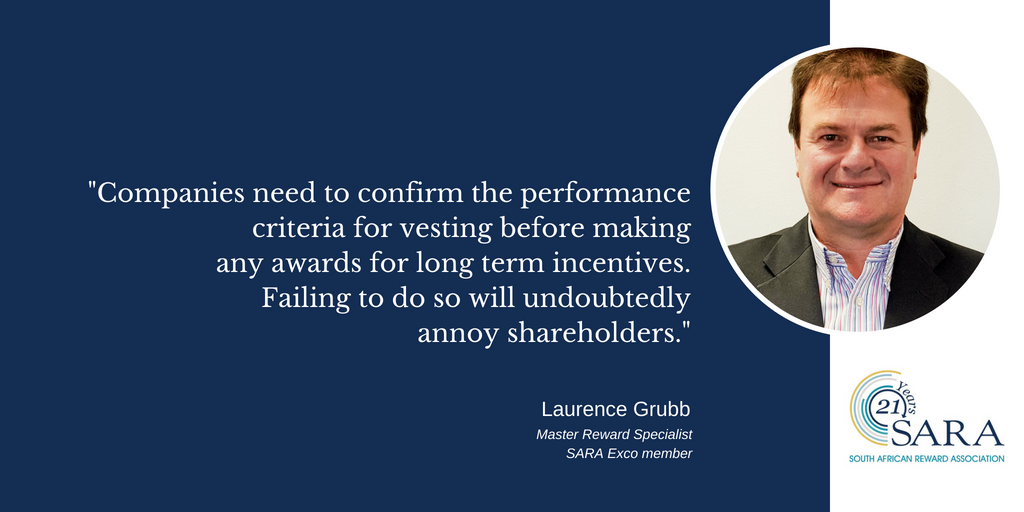|
Recent reports of shareholders voting against executive remuneration structures have again highlighted the need for increased transparency in the disclosure of not only the amounts paid, but how the amounts were calculated and the link to performance. Many companies have made significant progress with the disclosure of executive pay and the quality and content of remuneration policies and implementation reports.
However, the improved transparency of certain excessive executive pay packages has also fuelled the perception that all executives are paid exorbitant amounts of money, causing an ever increasing pay gap. Laurence Grubb, Master Reward Specialist and executive committee member of the South African Reward Association (SARA), says a handful of executives are still able to manipulate remuneration committees, despite notable efforts to follow the principles set out in King IV and the association’s guidelines. Committees agree to targets which are a little too soft or potential remuneration that is out of line with industry. “Although these executives are in the minority, it remains a concern and needs to be contained.” Independent advice needed Grubb says remuneration committees should be entitled to obtain independent advice from their own remuneration consultants to validate what has been presented to them by the executives. The cost for this service should be borne by the company. SARA published guidelines on the drafting of a remuneration policy and the implementation report at the beginning of the year which follows the principles set out in King IV. Some ‘old’ long term incentive schemes may have awards which were not linked to performance. Those shares may now be vesting, and with no performance linked to them, it is quite possible that shareholders will vote against such schemes. Grubb says companies need to confirm the performance criteria for vesting before making any awards for long term incentives. Failing to do so, will undoubtedly annoy shareholders. Barclays Africa experienced this first hand when shareholders voted against the company’s policy and implementation report earlier this month (May 2018). In terms of the King IV principle on remuneration, the policy should record the measures that the board commits to when 25% of the votes are exercised against either the remuneration policy or the implementation report, or both. These actions should then be communicated in the background statement in the following year. South Africa is the only country in which the threshold for these remedial measures is as low as 25%. In Australia, the UK and Belgium, among others, remedial measures are only mandated if 50% or more of the votes are cast against the remuneration policy and implementation report. Pay gap realities The pay gap in South Africa remains a burning issue, although companies have been trying to address it by offering larger annual increases for lower level workers and smaller increases at executive level. However, an increase of 5% on R2 million will always make a bigger gap than 8% on R100, 000. Several companies have also introduced the minimum wage, and in some instances, wages which exceed the minimum wage. In countries where the pay gap is much narrower, the level of skills, education and productivity of the lower end workers are much higher than in South Africa. Grubb says companies operating in those countries are typically able to pay much higher rates to their lower level employees because of the higher skills and productivity levels. “Unfortunately, in countries where education is severally limited and not at the right standard, the impact is felt mostly by those whose skills and level of education do not offer them the opportunity to increase their earning potential.” Companies find it difficult to continually pay higher salaries to lower levels and, inevitably where that does happen, there are job losses.
0 Comments
 Dr Mark Bussin, Executive Committee member of SARA Dr Mark Bussin, Executive Committee member of SARA Recent reports of Eskom executives awarding themselves R6 million bonus per person from a pool of R1.7bn has left a sour taste in the mouths of The National Union of Mineworkers (NUM). However, according to Dr Mark Bussin, exco member of the South African Reward Association (SARA), there are always two sides to a story. The trade unions are facing members on a daily basis regarding how tough it is to come out on one’s salary. “I think it is the next big wave to hit us – in work poverty (IWP). It affects more than half our workforce. People are struggling to come out on their salaries and they don’t understand what executives do to earn their millions. It causes resentment and anger amongst workers and creates a platform for radical elements, radical political parties and radical politicians,” says Dr Bussin. On the other hand, executives are under continual scrutiny, pressure, risk and forever increasing fiduciary responsibility. It is governance and onerous fiduciary duties that drives executive pay up and up. In Eskom’s case, they do run their business as a business should be run. However, with political interference setting unrealistic political goals and targets, it can put Eskom into the red. This is not entirely the Executive’s fault. Their original budget showed a profit, but the politicians, for example, instructed the electrification of several voter areas and they made a loss – not exactly their fault. “However, as right as the bonuses seem to the Eskom executives, there is a new word that I have coined called – the “optics” of remuneration. With rotating executives, blackouts, Medupi and general negative press – the optics don’t seem right to earn millions in bonus. This calls for wisdom and sensitivity on the part of Eskom executives. Accepting the millions is contentious and should be declined. Regardless of how lawful or technically correct the bonus calculation is. The optics aren’t right.” ENDS MEDIA CONTACT: Cathlen Fourie, 012 644 2833, [email protected], www.atthatpoint.co.za For more information on SARA please visit: Website: www.sara.co.za Twitter: @SA_reward LinkedIn: South African Reward Association Facebook: SARA – South African Reward Association |
Archives
March 2023
Welcome to the South African Reward Association newsroom.
Categories
All
|


 RSS Feed
RSS Feed